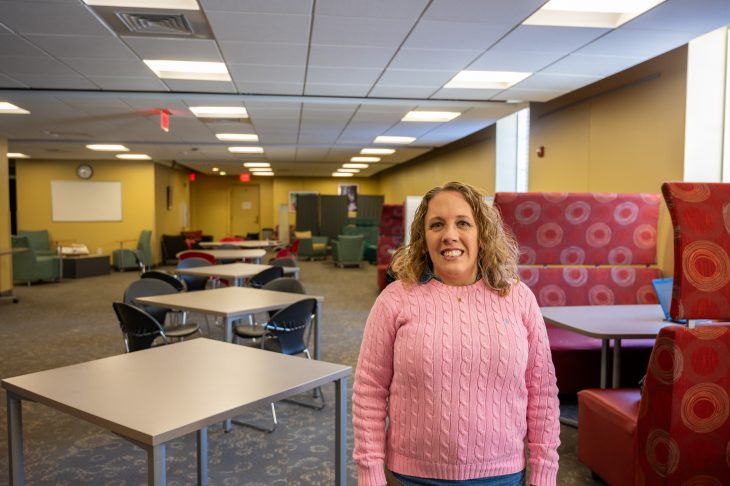
Angie Morton ’06 has spent her career working to give students success opportunities. With a background in elementary education, she taught in the classroom for nine years before transitioning to work at a nonprofit focused on serving students with language-based learning disabilities. She brings that wealth of experience to her alma mater as an accessibility coaching specialist embedded in Transylvania’s Academic Center for Excellence.
Morton, who primarily works with students registered with the accessibility services office, helps Transy students hone their academic abilities. “Students will come to me if they need help with managing test anxiety, if they want help with their study skills, or if they feel that sense of being overwhelmed — that happens a lot, and we can prioritize what can get done,” she explained.
Morton’s coaching offers students in academic recovery additional accountability for achieving their academic goals — but she stresses that the help that she offers can benefit any struggling student.
Much like tutoring, seeking help from an academic coach early in the term can make a genuine difference in student outcomes. “At the start of a new term, it’s a good idea to get some of these systems in place and make sure they are maintainable,” Morton noted, adding that sometimes students don’t realize that what they are doing isn’t serving them until they are deeper into the term. In those situations, Morton recommends reaching out to the ACE for help in making a change.
“Certainly, by midterms, if something’s not working, it’s important to get in so that you still have some time to turn the grade around,” she stressed.
One of Morton’s tips for success is for students to consider what their individual learning style is and match their study habits to their preferred modes of learning. “If you’re an auditory learner, but you’re studying just by reading your textbook, you’re setting yourself up to fail because that’s not how you learn best,” she explained.
Another support that Morton is adopting this term is Cogmed, a neuroscientific tool designed to increase attention. “Cogmed is research based and designed to improve your working memory and attention,” she said. “Not only can you stay focused on what you’re studying, but you’ll actually remember the information when it’s time to take the test.”
Morton learned about Cogmed — which has been researched on students with ADHD, individuals with traumatic brain injuries and pediatric cancer patients who are recovering from treatment — in a previous role, where she used the program as a dyslexia intervention. Completely free to Transylvania students, Cogmed is a self-paced program comprising 25 sessions that each take roughly 35-45 minutes.
“Ideally, students using Cogmed will check in with me, but they don’t have to,” Morton said, adding that she typically recommends that students complete 3-5 sessions per week for optimal pacing. After piloting the tool at Transy this spring, she plans to offer Cogmed to all incoming students during the fall 2024 term.
Morton hopes that her position will serve as a student advocate, removing barriers for potential Pioneers who want a Transylvania education but worry that the coursework will prove an insurmountable obstacle. Students interested in working with Morton can connect with her through email.

